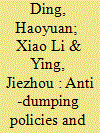| Srl | Item |
| 1 |
ID:
191150


|
|
|
|
|
| Summary/Abstract |
Anti-dumping policies, as one of the most important nontariff measures to protect a country's economic interests, can have an impact not only on a country's trade and social welfare, but also on capital flows. Anti-dumping measures can result in increased trade costs and alterations to exchange rate risk. This study investigates the impact of anti-dumping sanctions on the international portfolio allocations of global funds. Antidumping policies can decrease the proportion of a fund's investment portfolio allocated to recently-sanctioned countries. Closer trade ties between the sanctioned country and the country where a fund is domiciled exacerbate the divestiture, but stronger foreign direct investment links weaken the negative association. Some country and fund heterogeneities are also discussed. We find that more developed countries are less affected by the impact of anti-dumping measures on equity fund allocations; liberalization of the economy and stable government could also mitigate the negative impact of anti-dumping sanctions. High-risk funds, such as growth funds or funds that invest in leveraged buyouts, showed the greatest response to changes in anti-dumping regulations.
|
|
|
|
|
|
|
|
|
|
|
|
|
|
|
|
| 2 |
ID:
084435


|
|
|
|
|
| Publication |
2008.
|
| Summary/Abstract |
Abstract: With the increase of global integration, the peri-urban area (PUA) of megacities in Asia has become a favourite destination for foreign direct investment (FDI). This paper uses the PUA of Shanghai as a case study to investigate the impact of global forces on the urban expansion of the city, and the link between urban growth and sustainable development in this mega-urban context. Shanghai has grown impressively during the past two decades in terms of economic and physical transformation. Much of this transformation has rested on the unbridled exploitation of land and other environmental resources in its peri-urban area. This is characterised by the designation of development zones and the concentration of manufacturing FDI, resulting in dispersed growth and environmental degradation. The disruption of the physical environment, combined with the concentration of the urban poor in these areas (in particular 'temporary migrants'), has turned the PUA into a potential crisis point threatening the social and economic development of the city.
|
|
|
|
|
|
|
|
|
|
|
|
|
|
|
|